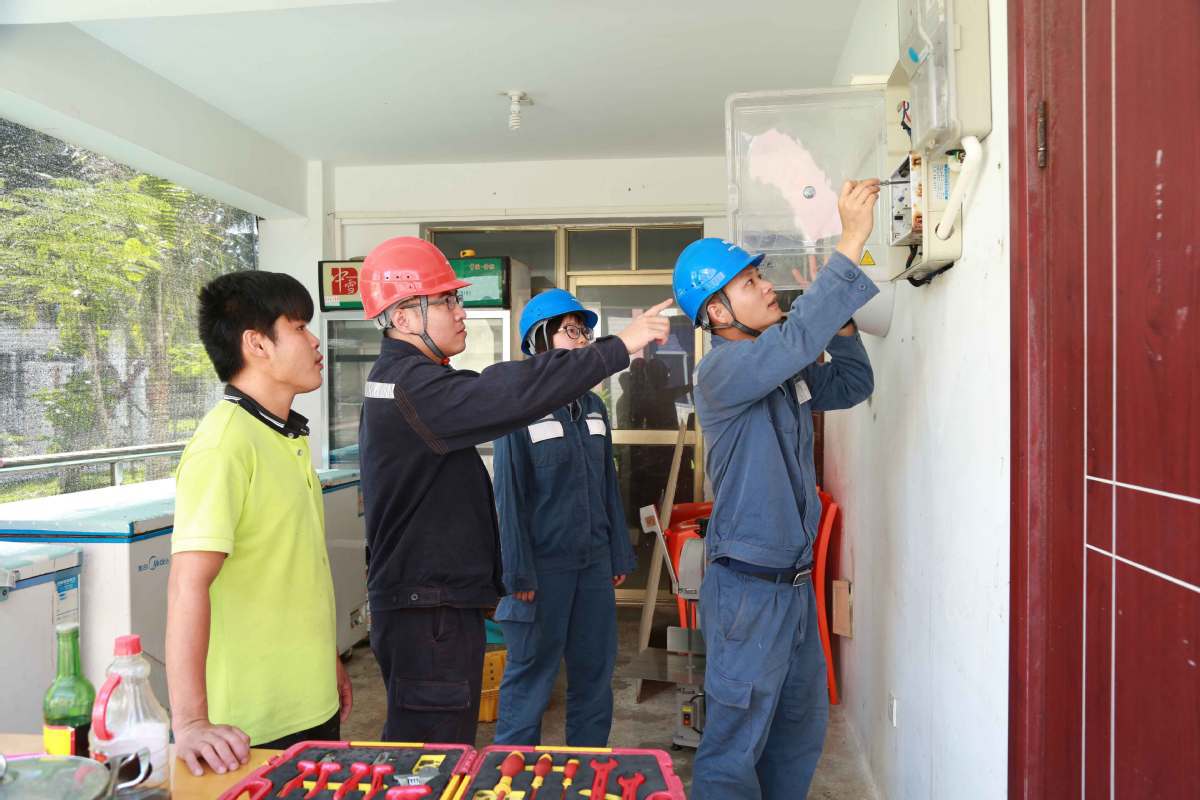Sansha workers power through the hard times


Electricians from the Xisha power station check the electricity supply at a village on the island. [Li Yongneng/For China Daily]
Sansha boasts spectacular natural sights, but for newcomers it can prove hard settling in this tropical paradise in the South China Sea.
Being far from family and friends, boredom and loneliness are real factors, while the high temperature, humidity, salinity and intense ultraviolet rays also can challenge a resident's endurance.
Electricians from China Southern Power Grid have handled all these hardships off and on for six years on Yongxing, the largest of the islands that make up Sansha and the seat of the city government.
Working in groups on a rotating monthly basis, they have maintained power supplies in Sansha since 2012, and in May they put its smart micro grid into operation. Driven by diesel and solar power, authorities say the system has further stabilized supplies across Sansha, where power outages were once daily occurrences.
Sansha administers the Xisha, Zhongsha and Nansha islands as well as the surrounding waters.
While immersing themselves in the boundless crystal seascapes of Yongxing has been a great experience, it has also been a tough one, according to the electricians.
"We didn't have a regular place to live in the early days," said Ye Shifeng, deputy head of the Sansha power supply bureau. "Daily showers with salty underground water made us feel sticky.
"We also had to go hungry when typhoons halted supply runs by No 1 Sansha and Qiongsha 3, our 'lifeboats', which travel once a week between Sansha and Wenchang on the eastern coast of Hainan island."
To stave off loneliness, the electricians have made friends with fishermen on the islands, and some have taken up hobbies such as playing guitar, basketball, fishing, astronomy and photography.
"Others just have fun reading or singing," said Feng Naihua, deputy director of the Xisha power station. The 36-year-old has spent a total of 1,000 days on Yongxing since 2013 and holds the record among his colleagues for most consecutive days on the island: 258.
Working in such a remote location can be a good opportunity for young people to shine.
Zhao Jingfei, 36, said he has led several innovative projects, including fixing solar panels on electrical carts to generate power and upgrading diesel pumping devices to cut the pump time from five hours to one.
"I've been leading 21 electricians in new technical research and development," he said, adding that the Sansha power supply bureau has opened a studio to promote innovation.
Workers are also offered various training courses, in and out of Sansha, aimed at improving their technical capabilities and lifelong learning ability.
Chen Huangyan, a graduate of North China Electricity University, said, "We young people have ample space to play a big role in a place like Sansha. It's not easy to work here, but it's an honor, as very few people have the chance to do so. Seeing the neon lights shine on Sansha's streets every night, I feel the value of my existence."
The Sansha power supply bureau has grown from 12 electricians to 57 since 2012. Today, each member is capable of tasks involving power generation, transmission, and supply and consumption services, said Wu Yu, the bureau's director. "We have a level of competence that is much higher than in other cities."
Working and living conditions have also improved on the island over time. The dormitories are more spacious and now have air conditioners and clean-water showers. Most of the electricians have also brought family photos and put them up around their bunks to remind them of home.
"During traditional festivals and the summer or winter vacations, it's become routine for the company to organize family members to visit Sansha and see how their loved ones live," said Jin Shan, deputy director of the bureau's general affairs office.
Green model
Between 2012 and when the smart grid went into operation in May, the power output in Sansha has grown tenfold, "providing strong support for the city's national defense efforts, and economic and social development", Wu said.
He said Sansha today is more like a modern city thanks to new infrastructure facilities such as desalination stations, which provide sufficient clean water, as well as garbage recycling stations and sewage treatment plants.
The islands also has good-quality television and Wi-Fi signals, and entertainment venues like a movie theater that shows new releases.
Fu Shuai, 32, who runs a seafood business, arrived on Yongxing in 2011. He said life on the island has become much more convenient thanks to the stable power supply.
"I've seven refrigerators and a walk-in freezer that can store 5 metric tons of fish. That was only a dream several years ago," he said.
The Sansha power supply bureau said it is now embarking on a new mission.
"We are going to replicate the smart power model on other islands in the Sansha group soon, and at the same time accelerate development of our wave power generation facilities," said Fu Yongfeng, deputy general manager of China Southern Power Grid's Hainan Power Grid.
"We're also busy participating in new energy innovation efforts to make the island city greener."







